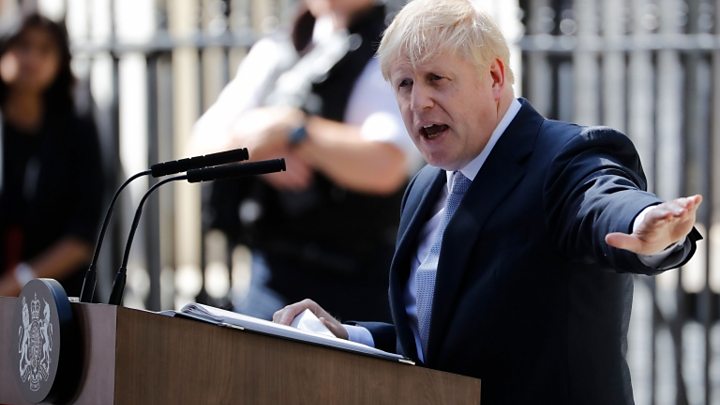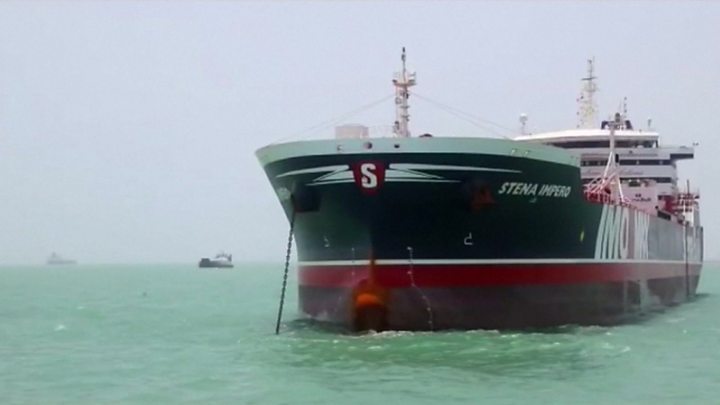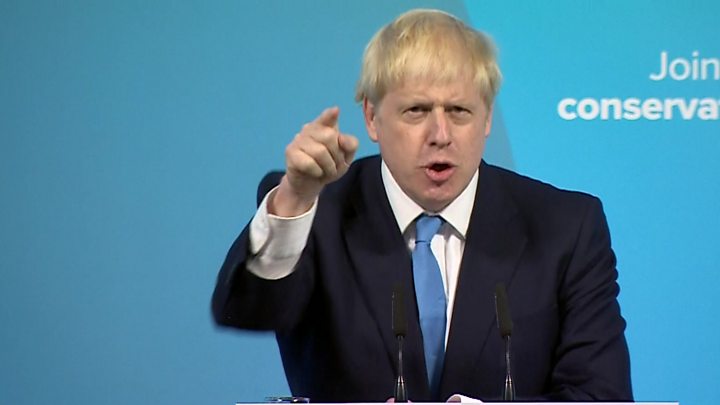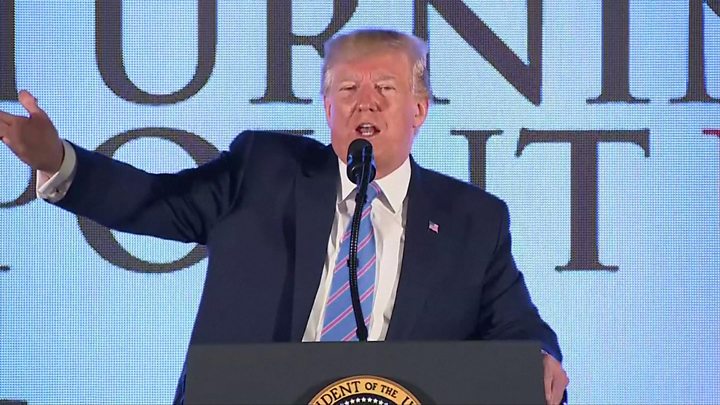British Prime Minister Theresa May takes questions for the last time in parliament before traveling to Buckingham Palace to formally submit her resignation.
The British government is in transition on Wednesday, as Prime Minister Theresa May steps down and Boris Johnson takes her place. Here’s how the day will unfold:
●May hosted her last session of Prime Minister’s Questions in Parliament and will soon deliver farewell remarks at 10 Downing Street.
● May will then submit her resignation to Queen Elizabeth II at Buckingham Palace.
● Johnson will formally become prime minister following his own audience with the queen.
● Johnson will deliver his first speech at Downing Street and begin to form his cabinet.
LONDON — Boris Johnson awoke Wednesday to a pile of British newspapers on his doorstep announcing his victory — some celebratory, some not. The Metro tabloid went with “Don’t Panic!” as an all-caps headline. The Express front page read, “Hang Onto Your Hats. Here Comes Boris!”
The transition of power in Britain is lightening quick. The United Kingdom is not without a premier for more than an hour. The outgoing Prime Minister Theresa May will curtsy to the Queen Wednesday afternoon and resign. Johnson will bow and be asked to form a new government.
When Johnson walks through the black enameled door of 10 Downing Street on Wednesday afternoon, he will fulfill what his biographers describe as his relentless “blond ambition” to follow his hero, Winston Churchill, into Britain’s top job.
He will immediately face the buzz saw of Brexit. And although his supporters hope the charismatic Johnson will rally a divided Parliament and a divided country in a way that Theresa May failed to do, he comes into office as a controversial leader, not especially well-liked by most Brits.
Johnson — a bombastic, Latin-quoting Oxford classicist with a mop of intentionally mussed yellow hair — made his name as an over-the-top journalist and a colorful London mayor. He then galvanized the successful Brexit campaign in 2016, which won him many fans and many enemies.
[Who is Boris Johnson? Everything you need to know about Britain’s next prime minister.]
On Wednesday, the transition began when Theresa May appeared in the House of Commons for her last session of prime minister’s questions, a weekly exchange between the ruling government and the opposition, as tradition dictates, “two sword lengths apart.”
There were many lines applauding May’s term and her 33 years in public service, and many calling her a failure.
When Labour Party leader Jeremy Corbyn laid into May, saying that under her tenure, child poverty was up, pensioner poverty was up, school class size was up, food bank use was up — May retorted that she was proud of her record. “That’s what my government has delivered. More jobs, healthier finances and an economy fit for the future.”
May eyed Corbyn and poked him with her blade: “As a party leader who has accepted when her time was up, perhaps the time is now for him to do the same.”
Theresa May tells Jeremy Corbyn to quit during her last exchange in Parliament as prime minister with the Labour leader.
May offered tepid support for her successor, whom opposition rivals called “flagrant” and “reckless,” a usurper with no mandate, and someone who is prepared to “sell our country out to Donald Trump and his friends.”
May said she was “pleased” to hand over to Johnson, whom I worked with when he was in my cabinet,” and who is committed to delivering Brexit. Johnson notably quit May’s Cabinet over her handling of Brexit.
After she steps down as leader, May will return to the back benches of Parliament as an ordinary and not very influential lawmaker.
Outside the House of Commons, Fleet Street was in a tizzy over possible picks for Johnson’s team — including the “great offices of state” — the chancellor, foreign secretary and home secretary — and what they could mean for Brexit and his style of governing. Johnson has just 99 days to find a Brexit solution. Otherwise, he has warned that Britain might accept the economic risk of leaving the bloc without a withdrawal agreement or transition period.
Will Johnson lean towards compromise? Or tilt towards a ‘no deal’ Brexit? The line-up of his top team could also signal whether he intends to govern, as he suggested on the campaign trail, like he did as mayor of London, where he was known as a liberal Conservative.
Britain’s newspapers heralded former London Mayor Boris Johnson as he prepared to take over as prime minister, July 24.
May will soon deliver farewell remarks at Downing Street and then travel to Buckingham Palace — probably under the watchful eye of hovering media helicopters — where she will tender her resignation to Queen Elizabeth II and recommend Johnson as the person who can command the confidence of the House of Commons.
After May’s car leaves the palace, one carrying Johnson will arrive for a ceremony known as “kissing hands.”
In the movie “The Queen,” starring Helen Mirren, the actor playing Tony Blair kissed the hand of the monarch, but in reality, there’s more likely to be shaking hands. Theresa May shook hands and curtseyed — deeply — during her meeting with the queen when she became prime minister.
Adrian Dennis
AFP/Getty Images
Britain's new Prime Minister Theresa May and her husband, Philip, stand outside 10 Downing Street on July 13, 2016.
Johnson will be the queen’s 14th prime minister. Over the course of her long reign, Elizabeth II has seen them come and go: Winston Churchill, Anthony Eden, Harold Macmillan, Alec Douglas-Home, Harold Wilson, Edward Heath, James Callaghan, Margaret Thatcher, John Major, Tony Blair, Gordon Brown, David Cameron, Theresa May and now Johnson.
Much attention today will focus on his remarks after he leaves the palace. The first speech a prime minister delivers is heavily scrutinized and often long remembered.
For her first speech as prime minister, May talked of tackling “burning injustices” in society and leading a government that worked for everyone, not the “privileged few.” Those promises for a Tory-led “social justice” program were often thrown back in her face, when May mostly failed to address those issues. She was consumed with Brexit. The same could happen to her successor.
Matt Hancock, a Conservative politician who has been helping with Johnson’s campaign, told the BBC he expected Johnson’s speech to include “a surprising amount of detail, especially on the domestic agenda.” He said that, at the same time as delivering Brexit, Johnson wanted to focus on domestic issues and pointed out that on the campaign trail Johnson spoke about education, social care and policing.
Once prime minister, Johnson is expected to start naming his new team and new cabinet. Johnson has said he wants a cabinet rich with pro-Brexit voices — with each chair filled by someone who is okay with the incoming prime minister’s vow, that if he does not get the Brexit deal he wants from Europe, then Britain will crash out with no deal.
Johnson handily won the leadership contest on Tuesday. The former foreign secretary Johnson captured 92,153 votes to current foreign secretary Jeremy Hunt’s 46,656 — a decisive victory.
Tolga Akmen
AFP/Getty Images
New Conservative Party leader and incoming prime minister Boris Johnsonleaves his campaign office in central London on Tuesday.
But the vote involved only dues-paying members of the Conservative Party. A mere 139,000 people cast ballots in a country of 66 million. A lot of Britons feel left out at a pivotal moment. On social media, #NotMyPM was one of the many Johnson-related hashtags trending. A YouGov survey found that 58 percent of Brits have a negative opinion of Johnson — a wicked-high number for a first day on the job.
The 55-year-old Johnson will take up residence at Downing Street. His 31-year-old girlfriend, Carrie Symonds, a former Conservative Party communications official and a top Tory spinner, may move in over the weekend, according to British news reports. Expect a lot of tabloid interest in this unprecedented arrangement.
When Johnson clocks in, he will face an overflowing in-tray of items that need urgent attention, including a showdown in the Persian Gulf with a belligerent Iran. The two countries have been in a tense standoff since Britain impounded an Iranian tanker suspected of sending oil to Syria, and Iran retaliated by seizing a British-flagged oil tanker last week.
Politics watchers are keen to see whether Johnson continues Britain’s effort to salvage the 2015 deal designed to discourage Iran from developing nuclear weapons, or whether he bends to U.S. pressure to impose sanctions on Iran.
[Want to understand Boris Johnson, Britain’s probable next prime minister? Read his incendiary journalism.]
But Johnson’s main challenge will be getting Britain out of the European Union.
May’s failure to deliver Brexit on time was the reason her Tory lawmakers ousted her.
Read more
Who is Boris Johnson? His life in photos.
Boris Johnson wins vote to be U.K. prime minister
Theresa May packs her bags, her legacy dominated by failure
Want to understand Boris Johnson? Read his journalism.
What Boris Johnson said about Trump when he wasn’t being so diplomatic
Boris Johnson says he’s prepared for a no-deal Brexit. Critics say he’s reckless.
Boris Johnson’s rise could be a preamble to his fall
Today’s coverage from Post correspondents around the world
Like Washington Post World on Facebook and stay updated on foreign news
Let's block ads! (Why?)
https://www.washingtonpost.com/world/europe/boris-johnson-uk-prime-minister/2019/07/24/42bce126-ac93-11e9-9411-a608f9d0c2d3_story.html
2019-07-24 11:59:01Z
52780336314805






